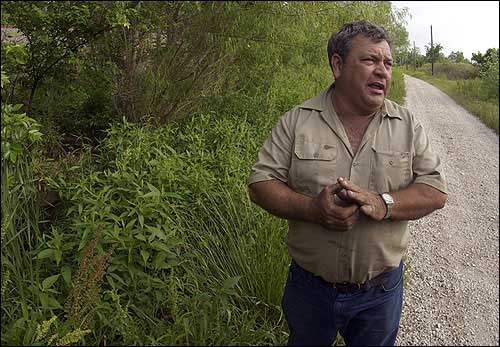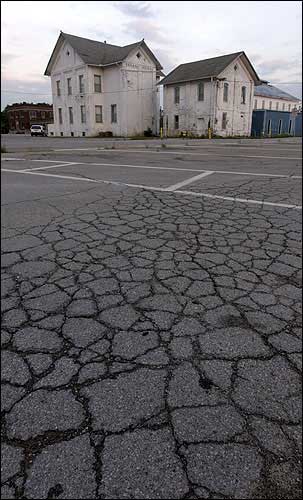Neodesha pollution blamed for illnesses
Residents suspect cancer caused by contaminants from former refinery
NEODESHA ? Susan Baker is promising to leave her hometown, driven out, she says, by the fear that a plume of pollution underground has sickened her child.
Science doesn’t appear to support her concerns; the percentage of cancer deaths in Neodesha is lower than the statewide average, and there’s no direct evidence that residents are coming into contact with the pollution — the legacy of an oil-refining past.
And yet, a parent’s worry is a powerful force. So the Bakers — husband Mark, son Marcus and daughter Hailey — plan to move once Mark completes his college education next summer.
Family illnesses
Since 2001, Marcus, who’s 8, has undergone heart surgery and a liver transplant to correct birth defects. Hailey, 4, is in good health.
“If they caused this for Marcus, they owe him an apology. I have no medical proof, but in my heart and head, I believe they caused this,” said Susan Baker, whose first husband died of cancer in 1993 at age 26, which she also blames on the contamination.
“We want to move somewhere where we think it is safe to live. We don’t know how bad the ground is contaminated here because nobody gives you the truth,” she said. “I don’t let my kids drink the tap water here.”
The pollution, about 15 to 25 feet below ground, is a 250-acre groundwater plume contaminated with benzene and other toxic chemicals. Benzene is known to cause cancer.
Legacy of contamination
State health officials say the chemicals came from a refinery Standard Oil opened in the town in 1897. It closed in 1970, leaving a legacy of contamination from decades of leaks, spills and a storage tank hit by lightning in 1968. It’s now an industrial park.

Rick Johnson, who lives and works across the street from the old refinery site, blames contamination for his leukemia. An underground plume of pollution in Neodesha was caused by years of oil refining in the area.
Neodesha, 92 miles southeast of Wichita, saw its first oil well drilled in 1892 and still celebrates that history with a replica oil derrick at the edge of town.
State and local officials dismiss the suggestion that the contamination is making people sick, although the town has sued BP, the corporate successor to Standard Oil, seeking a cleanup beyond what’s being done. Neodesha also wants reimbursement for potential damage to property values and lost revenue to the city.
BP spokesman Ron Rybarczyk, who declined to discuss the lawsuit, said 1,785 barrels of contaminated material have been removed since 2000. He also rejects any linkage between the contamination and illnesses.
Doctor doesn’t see connection
There’s no cause for concern because the groundwater isn’t used for drinking, according to the Kansas Department of Health and Environment, which oversees the cleanup. The agency says tests for benzene and other petroleum-related chemicals in the atmosphere have shown no immediate risk to air quality, either.
“We have satisfied ourselves that there is no inordinate health risk posed by this site,” said Kurt Limesand, unit chief in KDHE’s Bureau of Environmental Remediation.
Pam Chaffee, KDHE project manager for the cleanup, said part of the plume under a small portion of the residential area is getting smaller and chemical concentrations are decreasing slightly because of the cleanup. The part under the old refinery hasn’t changed in size.

A pair of administrative buildings are among the few above-ground remnants of the old Standard Oil refinery in Neodesha. The refinery operated from 1892 to 1970.
And Dr. Allen Moorhead, who has been seeing patients in Neodesha for 31 years, doesn’t see a connection.
“I don’t think we have any more cancer here than any place else. In my practice, I don’t have any more one year from the next,” said Moorhead, who’s also the city health officer.
KDHE statistics show that for 1998-2002, 16 percent of Neodesha deaths were cancer related, compared with 22 percent statewide. The average age of cancer deaths in Neodesha was 73.2 years, versus 71.6 statewide.
No alarm bells
But like the Bakers, Shannon and Trisha Ellis wonder. Their 3-year-old son, Bayden, has been diagnosed with a rare form of leukemia. It’s now in remission.
“I’m not saying it is or isn’t. It’s just a possibility,” Trisha Ellis said. “It could be a coincidence. He has leukemia and benzene is known to cause leukemia.”
Denise Jordan-Izaguirre, senior regional representative for the federal Agency for Toxic Substances and Disease Registry, said it’s hard to link contamination and illnesses.
“We are hearing about all types of cancer, and what you need to look at is what type of cancer can be caused by benzene, and what we didn’t see is an increase in that kind of cancer,” said Jordan-Izaguirre, whose office is in Kansas City, Kan.
She said the agency calls the contamination an “indeterminate health threat” and wants more data. Even so, it hasn’t found anything to set off alarm bells.
Minds made up
Some people have their mind made up.
“Standard is gone, but they left their mess here,” said salvage yard operator Rick Johnson, who lives a short distance from the old refinery site where he did contract work.
At 51, he has leukemia, which is in remission. He, too, blames the contamination.
“There’s no doubt in my mind, but how do you prove it?” Johnson said. “Fact is, benzene causes cancer, period.”






